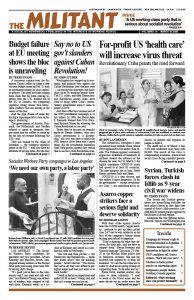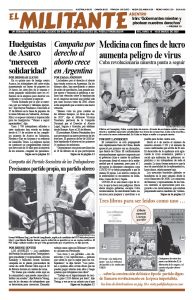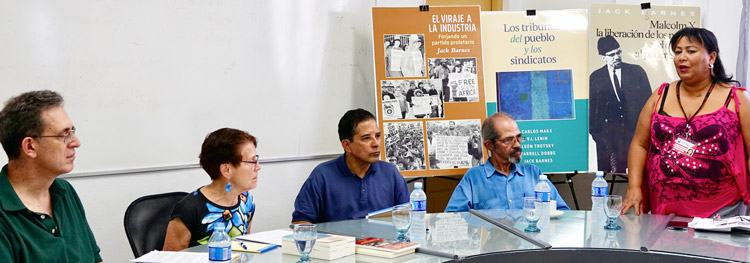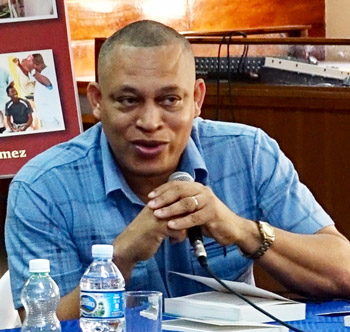HAVANA — “These books are important for understanding that in the most powerful capitalist country in the world, there are people explaining the need for a socialist revolution, a radical change in the system,” said Silvio Jova, representing the Central Organization of Cuban Workers (CTC) at a Feb. 13 meeting here. “It’s not the same as looking at the United States from afar. They are right there. And what happens in the U.S. matters a great deal to us in Cuba.”
Jova, a member of the editorial board of CTC, the magazine of the Cuban union federation, was speaking at a presentation of three books published in both English and Spanish by Pathfinder Press. The meeting was part of the Feb. 6-16 Havana International Book Fair, and following the fair, two more meetings featuring these titles were organized by the CTC.
These three books together “give us an opportunity to introduce the Socialist Workers Party to you,” said Mary-Alice Waters, a leader of the SWP and president of Pathfinder. “They present our communist continuity and course of action within the class struggle in the U.S. and the world. We’ve never before had such an important opportunity to do that here in Cuba.” (The talk by Waters will be printed in a coming issue of the Militant.)
The three books were The Turn to Industry: Forging a Proletarian Party by Jack Barnes, national secretary of the Socialist Workers Party; Tribunes of the People and the Trade Unions, with writings by communist leaders from Karl Marx, V.I. Lenin and Leon Trotsky to Farrell Dobbs and Jack Barnes; and Malcolm X, Black Liberation, and the Road to Workers Power, also by Barnes.
About 30 people attended each of the three presentations. The event at the book fair drew people who had visited the Pathfinder booth and wanted to learn more about the communist movement in the U.S. and internationally. Also present were a number of people who for years have known and worked with members of the SWP and its sister parties in other countries.
The two union-organized gatherings were held Feb. 20, one at the CTC’s national headquarters and the other at its nearby administrative center. Those attending included young union staffers as well as national leaders and longtime cadres of the CTC. Milexsy Guizado and Caridad Cabrera from the CTC’s Americas Department introduced the guest speakers, and International Relations Secretary Ismael Drullet addressed the first meeting. At the second, the speakers were welcomed by Belkis Batista, union secretary for workers in the administrative building.
Waters was the main speaker, joined by Jova at two of the events. Martín Koppel, a Pathfinder editor, spoke about another title presented at the Havana book fair — Red Zone: Cuba and the Battle Against Ebola in West Africa by Enrique Ubieta — and its importance in telling the truth about the example of the Cuban Revolution. Róger Calero, also a Pathfinder editor, chaired.
Continuity of communist movement
All three events were lively exchanges. A thread running throughout the discussions was a remark made by more than one person: “I used to think of you as Pathfinder Press, with your books on revolutionary politics. But now I see better who the people behind those books are — that you’re members of a party, doing political work as communists in the United States.”
At the book fair event, Jova told the audience that in reading Tribunes of the People and the Trade Unions he learned new things about the continuity of the revolutionary workers movement.
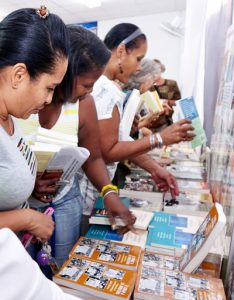
“In that book, the article by Marx on the trade unions is brief, but amazingly relevant to us in the 21st century,” he said. And the pieces by SWP leaders Farrell Dobbs and Jack Barnes “have maintained the same political course.” Many Cubans are surprised to learn there is a party acting on a communist course inside the U.S. working class, he noted, but these books “are not works of science fiction. It’s for real!”
Likewise, The Turn to Industry: Forging a Proletarian Party “was a pleasant surprise to me,” he said. It describes the concrete political work of “a party in the United States whose goal is for working people to take power.”
In Malcolm X, Black Liberation, and the Road to Workers Power, Jova said, “I found many things I didn’t know about.” He was impressed by what he learned about the power and resilience of a century and a half of struggles by African Americans, from the Civil War and Radical Reconstruction to Malcolm X to today.
He highlighted the importance of Malcolm X. In Cuba, he noted, “we often pay tribute to Black leaders such as Martin Luther King, who was a courageous man. But King didn’t claim to be a revolutionary. Malcolm X was.”
“I was also glad the book mentions Robert Williams,” he said. As a high school student, Jova had personally met the Black rights fighter in 1962, during a period when Williams lived in Cuba. “He gave a talk at the Havana Institute, where I was going to school.”
This book is relevant to Cuba as well, Jova remarked at one of the CTC-sponsored meetings. The fight to uproot the legacy of racist oppression “is a question that, as President [Miguel] Díaz-Canel has said, we have to continue to work on.” He was referring to a newly established government commission, headed by the president, to oversee a National Program Against Racism and Racial Discrimination.
Jova also urged the audience to read the article by Russian communist leader Leon Trotsky, “Trade Unions in the Epoch of Imperialist Decay,” which appears in Tribunes of the People and the Trade Unions. For some among the older generations in Cuba, he said, “Trotsky’s greatest sin — and that’s why we couldn’t read his writings — was saying that if the Soviet Union continued along the course it was on, it would return to capitalism. But it seems he was right! We have to read Trotsky, and this is one of the few books we have where we can read what Trotsky actually said.”
From the mid-1920s until his 1940 assassination by agents of the counterrevolutionary Stalinist leadership in the Soviet Union, Trotsky led the fight to continue Lenin’s internationalist course.
What turn to industry made possible
Waters began by taking up The Turn to Industry and the Trade Unions. “Without the turn to industry carried out by the cadres of the Socialist Workers Party beginning in the mid-1970s, the line of march that is also presented in the other two books would not have been possible,” she said. Building a party that is not only working-class in program and action, but composed in its big majority of workers in factories, rail yards, mines and refineries, is what “forged the SWP — and the political clarity of its cadres — today.”
Tribunes of the People and the Trade Unions explains “why organizing to strengthen and transform the unions is not only essential to the fighting unity and political striking power of the working class. It’s central to building a revolutionary party as well,” Waters said.
But our work neither begins nor ends there, she continued. A proletarian party “uses every manifestation of capitalist oppression to explain why it’s workers and our allies who can and will discover our own capacities, our own worth” and begin to break from dependence on the capitalist rulers’ government and their political parties.
Waters noted that Malcolm X, Black Liberation, and the Road to Workers Power brings to the fore the vanguard role of workers who are Black in the struggles of working people in the U.S., from the Civil War to today. It explains “why it is only the revolutionary conquest of power by the working class that will make possible the final battle for Black freedom — as you demonstrated here in Cuba — and open the road to a world based not on exploitation, violence and racism, but human solidarity. A socialist world.”
Why the working class
At the book fair meeting, an audience member asked Waters why she focused on the working class in the fight to transform society. “What about doctors and scientists?” he asked.
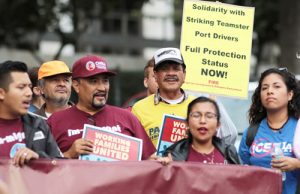
Waters pointed to how in Cuba, working people have played the decisive role in the socialist revolution. “What was the composition of the Rebel Army led by Fidel [Castro]? Overwhelmingly workers and peasants. It was working people who mobilized to take possession of the factories, plantations and other capitalist properties, and in 1961 defeated Washington’s mercenaries at Playa Girón. At the same time, half the doctors abandoned Cuba after the 1959 victory. It’s the working-class that has been decisive in defending and advancing the revolution here at every decisive moment right up to today.”
She said that in the U.S. and other imperialist countries, “it’s only by having a party whose membership is overwhelmingly working class that we will be able to maintain the proletarian revolutionary course that is necessary to lead a socialist revolution.”
Jova remarked that he had read U.S. President Donald Trump’s State of the Union speech, “and I was struck by how many times he talked about workers, jobs, wages, even unions.”
Waters replied that “the reason Trump talks about those real questions is that he’s trying to win votes from working people.” He gets a hearing “because conditions under Clinton, Bush and Obama were devastating for the working class,” and he claims his administration is doing something about it. “But neither Trump nor any other Democratic or Republican administration will do anything other than defend the interests of the capitalist class.”
Cuban workers resist US attacks
At one of the CTC-sponsored meetings International Relations Secretary Ismael Drullet said, “These books are very useful to us in the Cuban union movement” to learn about the experiences of working people in the U.S. He commented on how in Cuba today workers are resisting Washington’s stepped-up economic sanctions, which have brought shortages of fuel and other necessities.
Elena Chagues, CTC secretary for education and information, said what Washington hates about Cuba is that “here the working class is in power. The U.S. ruling class wants to force us to return to them the industries that we nationalized. But Cuban workers are defending the gains we’ve won.”
Referring to Red Zone: Cuba and the Battle Against Ebola in West Africa, Chagues said it was important to answer Washington’s attacks on Cuba’s internationalist medical volunteers. “Our doctors bring solidarity to people around the world, no matter what the obstacles. This is one of the things that strengthen our revolution.”
Ernesto Rodríguez, head of the CTC’s international relations work with Africa, noted that the Obama administration’s policies toward Cuba, including looser restrictions on U.S. travel to the island, were designed “to influence the Cuban people and get us to renounce our principles. But that wasn’t going to happen.” That’s why the current administration returned to harsher measures to try to strangle the Cuban economy, he said.
Rodríguez asked how workers in the U.S. can defend their interests in face of the capitalist offensive. “You said union membership in the private sector is down to the lowest level in a century,” he said. “That’s because workers in the U.S. don’t believe in their leaders. Why don’t they elect a new, alternative leadership?”
Róger Calero said, “The U.S. rulers’ attacks on the working class go back decades. There aren’t big struggles right now, but workers are looking for ways to use their collective power to defend their interests.”
“They’re responding to immediate problems like attacks on their wages and benefits,” Calero said. But in the course of struggles, “many workers begin to draw broader conclusions. It’s through these battles, over time, that a new leadership in the unions will develop. And a communist party that is part of those struggles is a necessary part of that process.”
Carlos Martí, who works in the CTC’s administrative building, asked, “I know the Democratic and Republican parties are similar, in fact, almost the same thing. But what do you think about Bernie Sanders’ campaign to be the Democratic presidential candidate? Do you share any part of his platform?”
“We share nothing with Sanders,” Waters replied. “We support no capitalist candidate or party. Ever. Sanders isn’t a socialist. He belongs to one of the two major imperialist parties in the U.S. His program is to reform capitalism, and he points to ‘Scandinavian socialism’ as his model.”
Solidarity with Cuban Revolution
Lázaro Calderín, head of the Cuban Communist Party committee among workers in the CTC’s administrative complex, told of his exchanges with members of visiting U.S. groups that consider themselves friends of Cuba. “On one occasion I was asked, ‘When will Cuba change? When will you have multiple parties instead of one? When will Fidel no longer be in the leadership of the party?’”
“That made me mad,” Calderín said. “I told them, ‘When will you change the ruling party in your country?’ There’s really only a single party in the U.S. I don’t see a difference between the Republicans and Democrats.”
Caridad Cabrera said that, in face of Washington’s economic squeeze on the Cuban people, “the solidarity we receive from around the world is very important. What more can the solidarity movement do to get the U.S. blockade against Cuba lifted?”
Waters replied, “What impressed us during this visit to Cuba was the tone and spirit of determination of working people to resist the stepped-up imperialist pressures. It’s more evident today than during the Obama years, when there were a lot of illusions here that the Obama administration represented a real change, that it wanted to help the Cuban people.”
Within the U.S. ruling class, she said, there are two basic views of how to destroy the Cuban Revolution. “Obama said Washington had not succeeded in achieving that goal through decades of economic warfare, and that it was time to try a different policy” by expanding tourism and exposing Cuba more to the pressures of the world capitalist market. “Then came the Trump administration, saying, ‘No, that won’t work, we must strangle the Cuban people.’
“It would be a lie to say this situation will change in the short term,” Waters said. “The solidarity movement isn’t strong enough anywhere in the world today to change it. Conditions will only change when there is a strong rise in working-class struggles in the U.S. and other countries. When there are revolutionary struggles in Latin America, Africa and other parts of the world. Since Cuba, there has been no victorious socialist revolution, and today there are no advancing revolutionary struggles anywhere. That reality weighs heavily on working people — on you in Cuba and on us in the U.S.”
What can we do today? “Stay the course. For the working class to keep fighting — both here and in the U.S. — for what we know is the only way forward: the road toward a socialist world,” she said.
“Cuba is surrounded by capitalism, it comes in through all the doors and windows. We know these are difficult conditions. But what’s decisive is what you’ve done for more than 60 years — fighting to maintain your revolutionary course. That’s what drives the imperialist powers crazy. That’s where their hatred of Fidel and their violence against the Cuban people come from.”
In the United States, Waters concluded, “the most important thing we can do today is to join the social and political struggles of working people, as we explain the truth about the Cuban Revolution’s example for us. To build a vanguard among working people that, as the class struggle develops, can lead a socialist revolution in the United States.”
